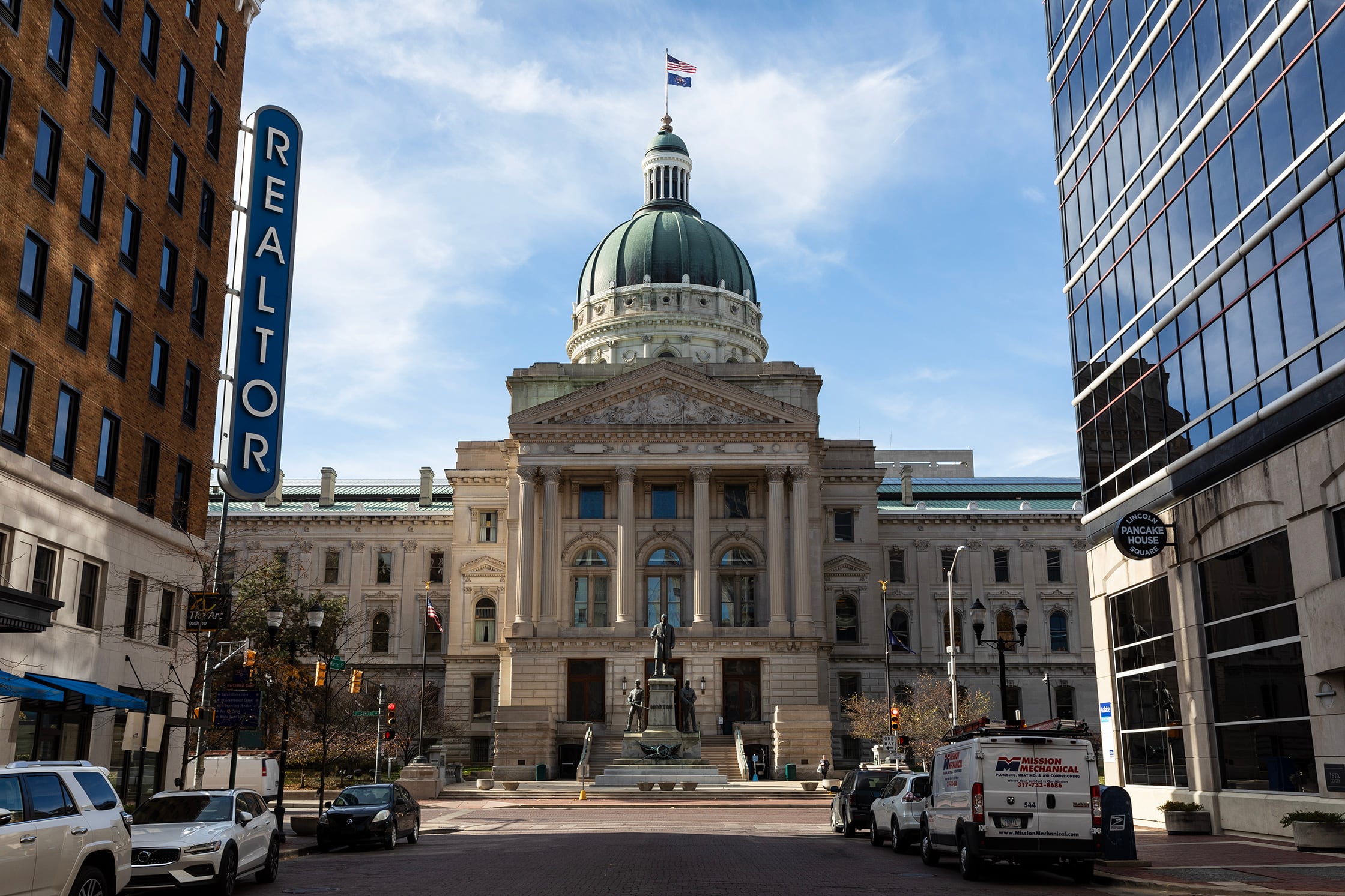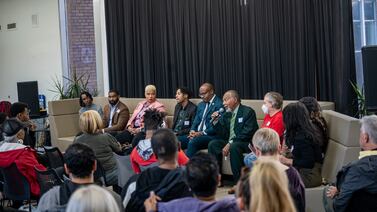Sign up for Chalkbeat Indiana’s free daily newsletter to keep up with Indianapolis Public Schools, Marion County’s township districts, and statewide education news.
Update: The Indiana legislative session ended on March 8, 2024. Here are the education bills that did and didn’t pass.
Indiana lawmakers advanced two bills on Wednesday that could further blur the lines between religious instruction and public schools, despite concerns that they might put schools in legal jeopardy.
Senate Bill 50 would allow schools to bring in chaplains as volunteers or employees to provide counseling to students and educators, while House Bill 1137 would require principals to let students leave campus for religious instruction under certain conditions.
Both bills passed their respective chambers’ education committees Wednesday despite questions about whether they maintain appropriate boundaries with respect to religion in public schools. Proponents say that neither bill requires students to receive religious instruction.
Under Senate Bill 50, school chaplains could provide only secular counseling unless the students or their parents gave permission for nonsecular guidance — prompting concerns from the ACLU of Indiana about violations of students’ constitutional rights.
Sen. Stacey Donato, a Logansport Republican who wrote the bill, described the proposal as another tool to address students’ social-emotional needs while alleviating the workload on the state’s school counselors. Indiana has one school counselor for every 694 students, according to one report from last year from the American School Counselor Association, which recommends a ratio of one for every 250 students.
The bill, which passed along party lines, received support from education groups, including the Indiana School Boards Association, the Indiana School Counselors Association, and the Indiana Urban Schools Association, who all said the bill provided clear guidelines for chaplain positions.
Last year, Texas Gov. Greg Abbott signed legislation allowing unlicensed chaplains to work in state public schools. Donato’s legislation says the chaplains must have master’s degrees and at least two years of counseling experience under the provisions of the bill, and would have to pass a criminal background check.
Their communication with students would be confidential, though Donato said she will amend the bill to require that they report child abuse or neglect.
The ACLU of Indiana raised concerns about violations of the U.S. Constitution’s establishment clause, which prohibits the government from establishing a religion. Similar concerns were echoed by Democratic lawmakers.
They also raised several questions, such as whether the chaplains would be school employees, what would happen if a student practiced a different religion from the chaplain, and what would happen if a student’s parent requested that they receive religious counseling against the student’s wishes.
Sen. Andrea Hunley, an Indianapolis Democrat, also said the bill didn’t specify how a parent would be notified if a student gave permission on their own for the chaplain to provide religious instruction — a departure from lawmakers’ recent efforts to ensure schools notify parents when students request to use different names or pronouns.
Republican lawmakers defeated an amendment to require parental permission for religious counseling, as well as another to require that the religious counseling be nonsecular.
Clergy members did not immediately throw their support behind the bill.
Chaplains may not have training in child development and psychology, and may not be qualified to act as counselors, said Gray Lesesne, dean and rector at Christ Church Cathedral in Indianapolis, who opposed the bill. And the provision protecting communication between a student and school chaplain as confidential could violate boundaries, he said.
“Even if I were to dispense secular advice to a young person as a chaplain, they would have a difficult time separating me from my role and calling and could interpret that as religious counseling whether I intend it to be or not,” he said.
Bill would change off-campus religious instruction rules
House Bill 1137, meanwhile, would bolster an existing Indiana law that allows students to leave school grounds for religious instruction for up to 120 minutes per week, subject to their principals’ discretion.
Under the bill, principals would be required to allow students to leave. The principals would work to determine an appropriate time to do so in collaboration with parents and religious organizations. In order to leave for religious instruction, students must not be listed as chronically absent.
The bill received broad support from lawmakers and advocates for religious instruction, who said many parents wanted to provide students religious teaching during the school day.
While the bill passed unanimously out of committee, Democratic lawmakers and representatives of public school organizations raised concerns about its impact on student absenteeism and academics.
With several religious organizations potentially pulling students out of the school day, the bill takes away principals’ discretion to keep academic time intact, said Christopher Lagoni, executive director of the Indiana Small and Rural Schools Association.
Furthermore, Rep. Ed DeLaney, an Indianapolis Democrat, said it empowered religious organizations to pressure public schools into allowing students to leave — and put schools at risk of lawsuits.
Still, advocates for the bill said releasing students for religious instruction — a concept protected under U.S. law — allowed students to take religious lessons during times that didn’t conflict with academic courses or after-school extracurricular activities.
“A lot of parents want the ability to send a message to their students, this is how important it is to our family that you have religious instruction,” said Joel Penton, founder of LifeWise Academy, a national organization that provides Bible-based education to public school students off-campus during the school day.
Dennis Gutwein, a board member at the West Central School Corporation, said students at his district took LifeWise classes during library hours, but that the librarian allowed them to visit at other times during the day, like during study hall.
Committee members also added an unrelated amendment to House Bill 1137 that seeks to bolster civic education in the state by creating a seal to recognize excellence in civics for students, teachers, and schools.
Both HB 1137 and SB 50 will advance to their respective chambers.
You can track HB 1137 and SB 50 on the General Assembly’s website.
Aleksandra Appleton covers Indiana education policy and writes about K-12 schools across the state. Contact her at aappleton@chalkbeat.org.





